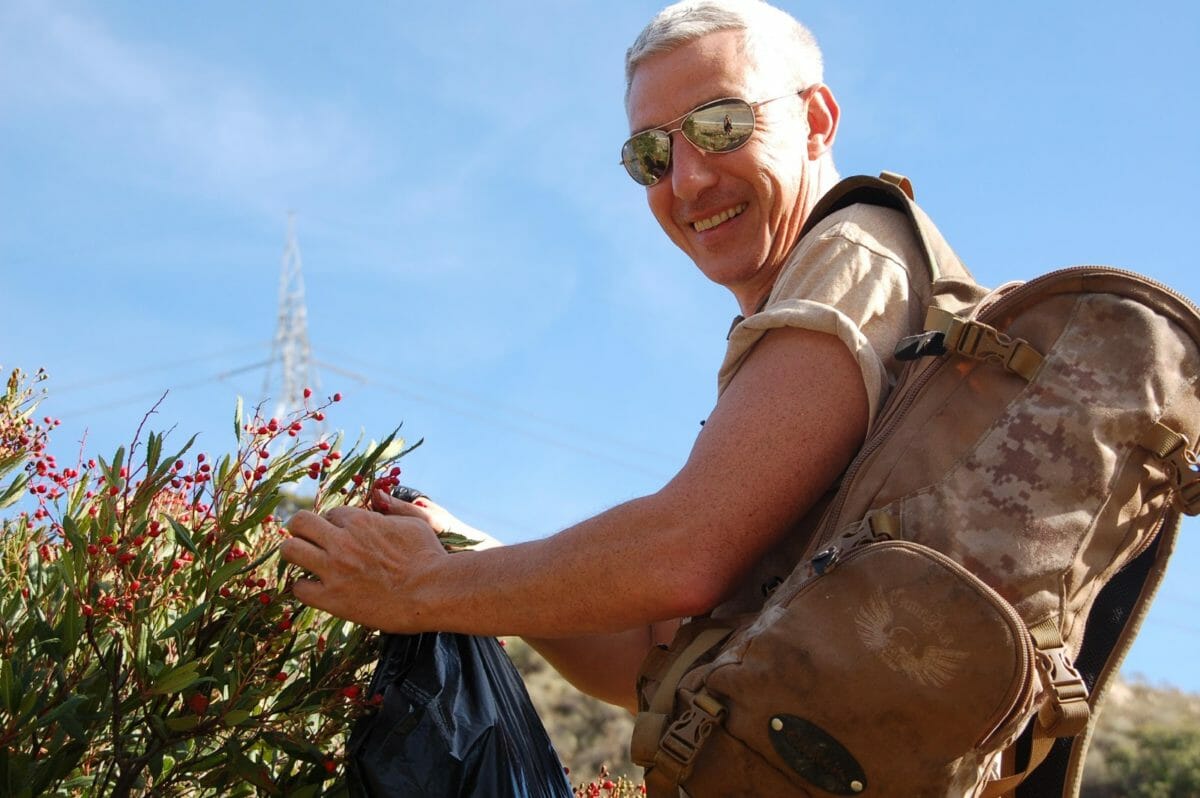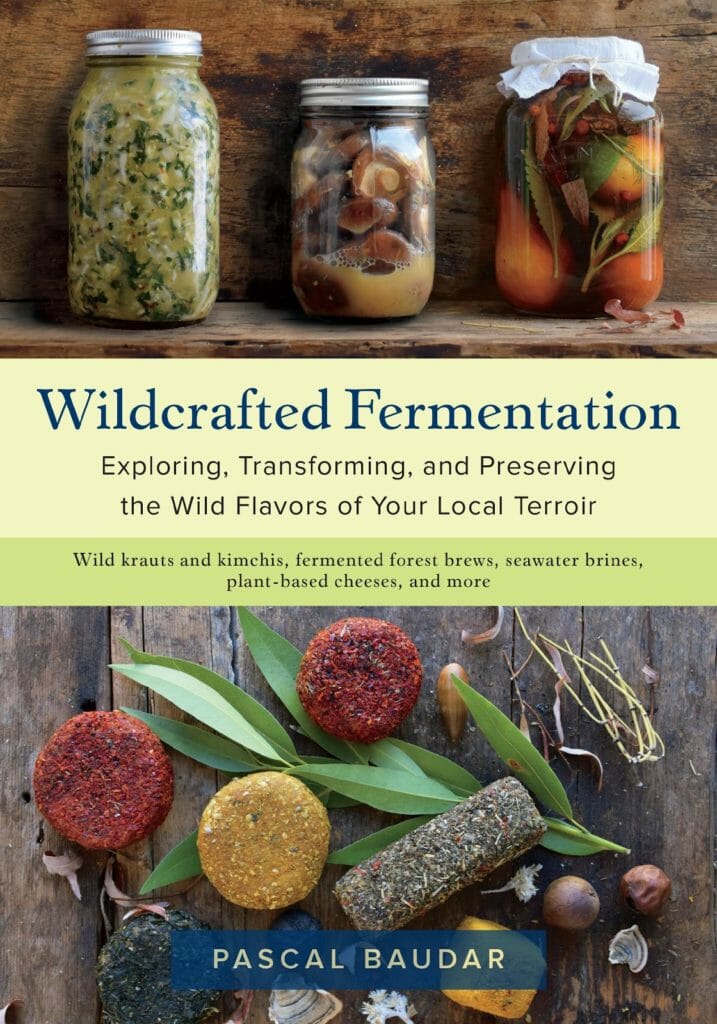Born to be Wild: Q&A with Master Forager Pascal Baudar
Baudar dives into fermenting wild food in his latest book, Wildcrafted Fermentation.
Born to be Wild: Q&A with Master Forager Pascal Baudar
Baudar dives into fermenting wild food in his latest book, Wildcrafted Fermentation.

Pascal Baudar provides an in-depth look at lacto fermentation with wild food recipes in Wildcrafted Fermentation. by Mia Wasilevich
Pascal Baudar is no stranger to the wilderness. The Los Angeles-based forager has paved a path in a unique career that blends wild edibles with traditional food preservation methods and contemporary cooking techniques.
His innovative methods have been the subject of books, classes and workshops he’s offered around the world. And his latest book, Wildcrafted Fermentation: Exploring, Transforming, and Preserving the Wild Flavors of Your Local Terroir, takes a deep dive into the art of lacto fermentation, with a how-to education in preserving the flavors in your backyard.
Baudar talked to Modern Farmer about his latest book, why he believes more people should live off the land and whether he thinks invasive plants can break into mainstream food culture.
The following interview has been edited and condensed for clarity

Modern Farmer: What inspired you to write this latest book on lacto fermentation?
Pascal Baudar: I think in this time of climate change and pollution and urban expansion, we’re starting to look at the issue of how can we use wildcrafting as a way to help the environment not only be sustainable but actually help the environment.
In 2017, I started to approach the concept of doing lacto fermentation with wild edibles and did so for two years. Lacto fermentation for me has been incredible because you can really deal with some of those wild plants we have locally that people don’t know what to do with. For example, mustard roots; they’re too tough to eat. But by crushing them and fermenting them in a brine, you can take the flavor from those roots and you can make some incredible gourmet soup. For me, lacto fermentation really started to create a new level of dealing with wild plants and understanding how to get those wild plants from a culinary perspective.
MF: We’re seeing fermented food in general become increasingly popular, but it’s expected to grow. There was a recent global market report that projected an increase of $61.21 billion in 2018 to $96.34 billion by 2026. Why do you think this is something people are buying into?
PB: People are buying into this because it’s healthier. People are becoming more and more aware of nutrition and food and they also realize that the crap you’re buying at the store—it’s really crap.
There’s a lot of processed food. It’s all pasteurized, it’s all cooked or it’s all dehydrated. There’s nothing there that’s alive, so people are starting to have health problems. For example, they don’t have good probiotics to create good gut flora. But the modern diet is not what it’s supposed to be and lacto fermentation is a fantastic way to explore better nutrition. And a lot of chefs are also pushing this trend.
MF: What about invasive plants? This is something central to your work and you’ve been called a visionary for integrating wild food into culinary practice. Do you think that there’s potential for it to catch on?
PB: I think it should go mainstream, but I don’t think it will go mainstream. People don’t know the plants they can eat. And a lot of American people would rather go to the store. They go to work and they just want to go home and watch T.V.
What I’m really trying to do is plant a seed in people’s heads. I’m trying to make them look at an issue of herbicides and pesticides and the use of all chemicals, and also I’m opening their eyes to the issue of food waste. We’re always using herbicides and throwing away wild resources. People can go into the hills and pick up 20 pounds of mustard if they wanted to because it’s everywhere. So, I think what I try to tell people is that there’s a positive solution here.
MF: In the book, you touch on how the act of wild crafting is a rewarding experience. What do you mean by that?
PB: It’s only been in the last few generations that we’ve been disconnected from nature, but if you look at the history, there’s always been this deep connection. It’s in our DNA, but people are blown away when they come to my class because in the modern world it’s so complex: paying taxes, taking an uber, being online. With wildcrafting and reconnecting to nature with what is available, we’re treating our land the right way.
People are able to realize that food is not just available at the store. You can actually find more food in the wilderness than the regular supermarket. You can be healthier and, at the same time, you can improve the environment. This is a win-win situation.
MF: For those who are curious about wildcrafting fermentation but might feel like it’s daunting, how do you make it accessible?
PB: In this book, I’ve chosen the most common weeds you can think of. I could have gone way deeper, but I wanted everybody to be able to use them. If you grow food in your garden, you are going to find those weeds. This is just adding another layer of creativity for those people who didn’t know they could use their dandelions, for example.
The cool thing about my book is that not a lot of people know that you can do lacto fermentation with wild food. There is no book on the subject of using this method, but I think people should also take my book as a book of ideas and concepts. I know that I’m working with wild foods, but all of the recipes and ideas can be done with regular food.
Follow us
This work is licensed under a Creative Commons Attribution-NoDerivatives 4.0 International License.
Want to republish a Modern Farmer story?
We are happy for Modern Farmer stories to be shared, and encourage you to republish our articles for your audience. When doing so, we ask that you follow these guidelines:
Please credit us and our writers
For the author byline, please use “Author Name, Modern Farmer.” At the top of our stories, if on the web, please include this text and link: “This story was originally published by Modern Farmer.”
Please make sure to include a link back to either our home page or the article URL.
At the bottom of the story, please include the following text:
“Modern Farmer is a nonprofit initiative dedicated to raising awareness and catalyzing action at the intersection of food, agriculture, and society. Read more at <link>Modern Farmer</link>.”
Use our widget
We’d like to be able to track our stories, so we ask that if you republish our content, you do so using our widget (located on the left hand side of the article). The HTML code has a built-in tracker that tells us the data and domain where the story was published, as well as view counts.
Check the image requirements
It’s your responsibility to confirm you're licensed to republish images in our articles. Some images, such as those from commercial providers, don't allow their images to be republished without permission or payment. Copyright terms are generally listed in the image caption and attribution. You are welcome to omit our images or substitute with your own. Charts and interactive graphics follow the same rules.
Don’t change too much. Or, ask us first.
Articles must be republished in their entirety. It’s okay to change references to time (“today” to “yesterday”) or location (“Iowa City, IA” to “here”). But please keep everything else the same.
If you feel strongly that a more material edit needs to be made, get in touch with us at [email protected]. We’re happy to discuss it with the original author, but we must have prior approval for changes before publication.
Special cases
Extracts. You may run the first few lines or paragraphs of the article and then say: “Read the full article at Modern Farmer” with a link back to the original article.
Quotes. You may quote authors provided you include a link back to the article URL.
Translations. These require writer approval. To inquire about translation of a Modern Farmer article, contact us at [email protected]
Signed consent / copyright release forms. These are not required, provided you are following these guidelines.
Print. Articles can be republished in print under these same rules, with the exception that you do not need to include the links.
Tag us
When sharing the story on social media, please tag us using the following: - Twitter (@ModFarm) - Facebook (@ModernFarmerMedia) - Instagram (@modfarm)
Use our content respectfully
Modern Farmer is a nonprofit and as such we share our content for free and in good faith in order to reach new audiences. Respectfully,
No selling ads against our stories. It’s okay to put our stories on pages with ads.
Don’t republish our material wholesale, or automatically; you need to select stories to be republished individually.
You have no rights to sell, license, syndicate, or otherwise represent yourself as the authorized owner of our material to any third parties. This means that you cannot actively publish or submit our work for syndication to third party platforms or apps like Apple News or Google News. We understand that publishers cannot fully control when certain third parties automatically summarize or crawl content from publishers’ own sites.
Keep in touch
We want to hear from you if you love Modern Farmer content, have a collaboration idea, or anything else to share. As a nonprofit outlet, we work in service of our community and are always open to comments, feedback, and ideas. Contact us at [email protected].by Lindsay Campbell, Modern Farmer
March 12, 2020
Modern Farmer Weekly
Solutions Hub
Innovations, ideas and inspiration. Actionable solutions for a resilient food system.
ExploreExplore other topics
Share With Us
We want to hear from Modern Farmer readers who have thoughtful commentary, actionable solutions, or helpful ideas to share.
SubmitNecessary cookies are absolutely essential for the website to function properly. This category only includes cookies that ensures basic functionalities and security features of the website. These cookies do not store any personal information.
Any cookies that may not be particularly necessary for the website to function and are used specifically to collect user personal data via analytics, ads, other embedded contents are termed as non-necessary cookies.
His teachings and fermented beverages are spectacular. Highly recommended.